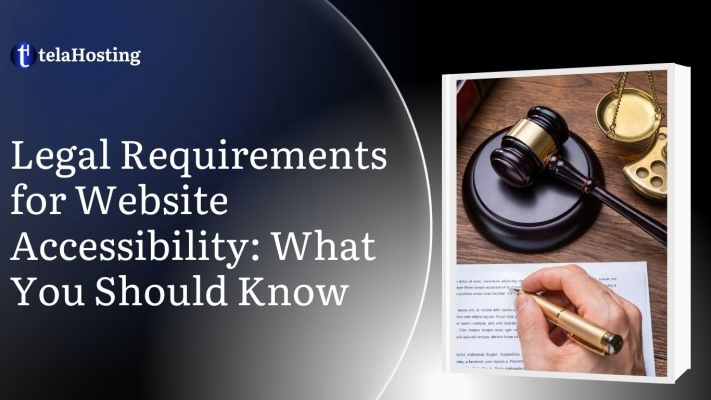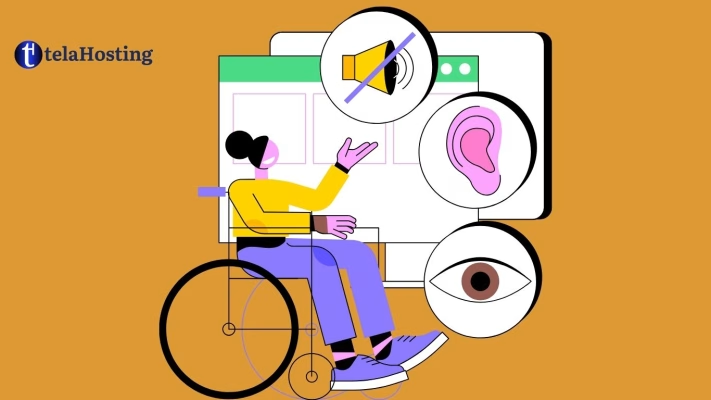
Legal requirements for making websites accessible are gaining more and more attention from businesses and organizations around the globe. Many governments, Nigeria included, have enacted laws to guarantee that individuals with disabilities can access online content just like everyone else. So, if your website isn’t accessible, you might be breaking the law—and that could result in lawsuits, hefty fines, and a tarnished reputation.
Imagine stepping into a store where the entrance lacks a wheelchair ramp, making it impossible for individuals with disabilities to get inside. Now, let’s shift our focus to the online realm. If a website isn’t accessible, it’s akin to shutting out millions of users who depend on screen readers, keyboard navigation, or other assistive tools to explore the internet.
At telaHosting, we’re passionate about making the internet inclusive for everyone. We aim to assist businesses in Nigeria and beyond in understanding and adhering to website accessibility laws. This guide will cover:
- What website accessibility truly mean
- The legal requirements surrounding website accessibility
- How Nigerian and international laws impact businesses
- Steps to ensure your website is legally compliant
If you own a business, manage a website, or work in digital marketing, this guide is crucial for helping you stay compliant and enhancing the experience for all users.
What is Website Accessibility?
Website accessibility means designing websites so that everyone, including people with disabilities, can use them easily. A well-designed, accessible website allows users to:
- Read content easily, even with visual impairments
- Navigate without using a mouse (e.g., through keyboard shortcuts)
- Understand content even if they have hearing or cognitive disabilities
Why Does Website Accessibility Matter?
- Inclusivity: Helps all users access content, not just those without disabilities.
- Legal Protection: Helps businesses avoid lawsuits and fines.
- Better SEO: Google ranks accessible websites higher in search results.
- More Customers: Over 1 billion people worldwide have disabilities—accessible websites increase your audience.
Example: A person who is blind uses a screen reader to read website content aloud. If your website doesn’t have proper alt text for images or lacks keyboard navigation, they can’t use it properly.
Who Benefits from Website Accessibility?

Many people think website accessibility is only for blind users, but it benefits many different groups, including:
- People with visual impairments (blindness, low vision, color blindness)
- Deaf or hard-of-hearing individuals who need subtitles for videos
- People with physical disabilities who can’t use a mouse and rely on keyboard navigation
- Elderly users who may have trouble reading small text
- People with learning disabilities (like dyslexia) who need clear and simple text
Example: Let’s say a blind man is trying to book a flight online. If the booking button has no text description, their screen reader won’t be able to read it, making it impossible for them to complete the process.
Why Are There Legal Requirements for Website Accessibility?
Many governments have passed laws and regulations to make sure that websites are accessible to all users, including people with disabilities. These laws are designed to:
- Prevent discrimination against people with disabilities
- Ensure equal access to online services and information
- Hold businesses accountable for providing accessible digital spaces
Ignoring website accessibility isn’t just bad for users; it can also lead to legal consequences for businesses.
Important Website Accessibility Laws You Should Know
Many countries, including Nigeria, have laws that require websites to be accessible. These laws help protect people with disabilities from discrimination in digital spaces.
Web Content Accessibility Guidelines (WCAG): The Global Standard
Most accessibility laws are based on the Web Content Accessibility Guidelines (WCAG), created by the World Wide Web Consortium (W3C).
WCAG has four key principles:
- Perceivable: Users must be able to see and hear content clearly (e.g., adding text descriptions for images).
- Operable: Users must be able to navigate the site using a keyboard or assistive tools.
- Understandable: Text and navigation should be clear and easy to understand.
- Robust: The website should work with all assistive technologies.
Example: If your website has a low contrast between text and background, people with low vision won’t be able to read it. WCAG recommends strong color contrast to make text clearer.
Nigeria’s Disability Act and Accessibility Laws
In Nigeria, the Discrimination Against Persons with Disabilities (Prohibition) Act, 2018 states that businesses and government websites must be accessible.
Key requirements for Nigerian businesses:
- Government and corporate websites must support assistive technologies like screen readers.
- Websites should provide text alternatives for images and subtitles for videos.
- Failure to comply can result in fines and legal action.
Example: A Nigerian bank that doesn’t offer accessible online banking may be violating this law. If users with disabilities can’t complete transactions, the bank could face complaints or penalties.
International Website Accessibility Laws
If your business serves international customers, you may also need to comply with global accessibility laws, such as:
- Americans with Disabilities Act (ADA): USA
- Equality Act 2010: UK
- Accessibility for Ontarians with Disabilities Act (AODA): Canada
- European Accessibility Act (EAA): Europe
Example: If you sell products online to customers in the United States, your website must follow ADA compliance rules, or you risk facing lawsuits.
Consequences of Non-compliance with Accessibility Laws
Many businesses think, “Accessibility doesn’t apply to me,” but the truth is: Ignoring accessibility laws can lead to serious consequences!
Legal Consequences
- Lawsuits: Businesses worldwide have been sued for having inaccessible websites.
- Fines & Penalties: Companies can face heavy fines for non-compliance.
- Bad Reputation: Ignoring accessibility hurts your brand image.
Example: In the U.S., Netflix, Domino’s Pizza, and Beyoncé’s website have all been sued for not being accessible.
Business Consequences
- Lost Customers: Over 1 billion people worldwide have disabilities. If your website isn’t accessible, you are losing potential customers.
- Bad Reputation: Ignoring accessibility makes your business look unprofessional and non-inclusive.
Example: In 2019, Domino’s Pizza was sued in the U.S. because its website wasn’t accessible to blind users. They lost the case, costing them millions of dollars in legal fees.
How to Make Your Website Legally Compliant
Here are simple steps to make your website meet accessibility laws:
Step 1: Use Proper HTML for Screen Readers
- Use semantic HTML (<h1>,<p>, <ul>) to structure content properly.
- Add alt text (alt=””) to describe images for visually impaired users.
Example: <img src=”nigeria-web-hosting.png” alt=”Affordable web hosting services in Nigeria by telaHosting”>
Step 2: Ensure Keyboard Accessibility
- Make sure users can navigate without a mouse using the Tab key.
- Use aria-label for buttons and interactive elements.
Example: <button aria-label=”Submit your contact form”>Submit</button>
Step 3: Add Captions & Transcripts for Videos
- Include closed captions for all videos.
- Provide text transcripts for podcasts and audio files.
Example: If your business has a promotional video, add captions like:
“Welcome to telaHosting, Nigeria’s leading web hosting provider.”
Step 4: Improve Text Readability And Test Your Website
- Use clear fonts and strong contrast between text and background.
- Use free tools like WAVE, Axe, or Google Lighthouse to check for accessibility issues.
- Ask people with disabilities to test your website.
Conclusion
Website accessibility is not just a legal requirement; it’s a way to make the internet fair and accessible to everyone.
- Website accessibility is required by law in Nigeria and many other countries.
- Non-compliance can lead to lawsuits, fines, and lost business.
- Following accessibility best practices improves SEO, user experience, and brand reputation.
At telaHosting, we help businesses in Nigeria build legally compliant, accessible websites that work for everyone. Contact us today and we will get it done.
FAQs
1. Is website accessibility a legal requirement in Nigeria?
Yes! The Disability Act 2018 requires businesses to make their websites accessible to people with disabilities.
2. How do I know if my website is accessible?
Use tools like Google Lighthouse, WAVE, or a screen reader to test your website.
3. Does website accessibility improve SEO?
Yes! Google favors accessible websites, helping them rank higher in search results.